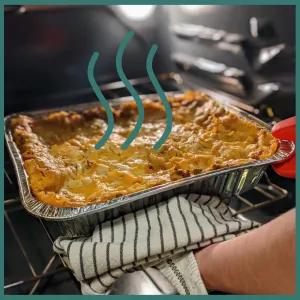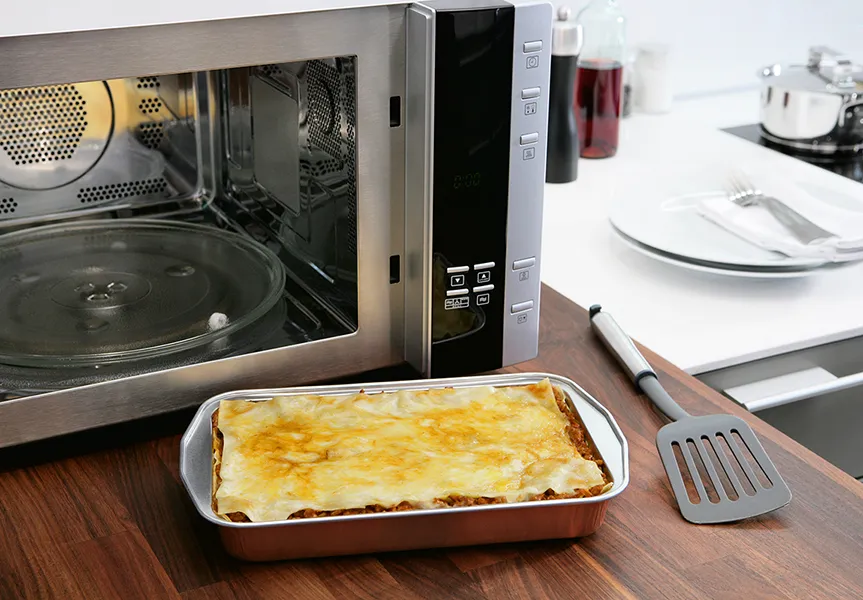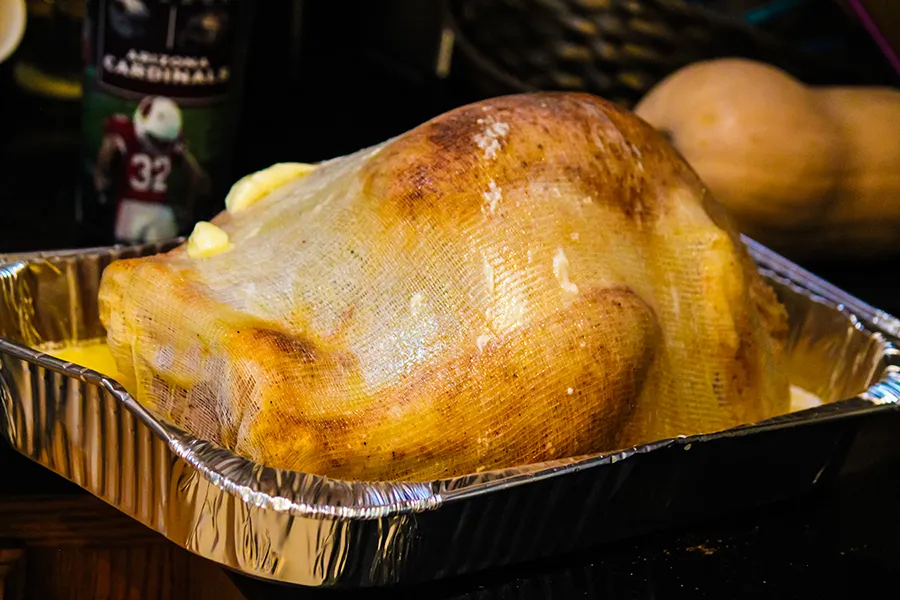Aluminum foil pans are extremely helpful culinary tools. It can be used to cook and heat in high-temperature environments such as an oven or microwave. Aluminum foil trays can also be used for food packaging, such as cakes, breads, and pastries, to keep food fresh and tasty. It can also be used for grilling to avoid direct contact with food while maintaining great flavor. Even deep-processed aluminum foil goods can be found in our usual takeaway lunch boxes – aluminum foil trays. Because aluminum foil trays are so commonly used, they naturally pose a number of safety concerns. This article will discuss the baking safety of aluminum foil trays.

Advantages Of Aluminum Foil Pans:
- Lightweight and easy to carry: The aluminum foil tray is made of aluminum foil, which is lightweight, easy to carry and convenient to use.
- High temperature resistance: The aluminum foil tray can withstand high temperatures and is not easily deformed. It is suitable for cooking and heating in high-temperature environments such as ovens and microwave ovens.
- Moisture-proof and anti-oxidation: Aluminum foil trays have good moisture-proof and anti-oxidation properties, which can maintain the freshness and taste of food.
- Safety and hygiene: Aluminum foil trays do not contain harmful substances, will not contaminate food, and comply with food hygiene standards.
Should The Light Side Touch The Food Or The Dark Side When Baking?
When baking, it is recommended to keep the dark side of the foil in contact with the food. Here’s why:
- Anti-stick: The shiny side is usually smoother than the dark side, which makes it less likely for food to stick to the foil. This is especially useful for baking cookies, pastries, and other foods that tend to stick.
- Bake evenly: The shiny surface reflects heat and helps distribute heat more evenly, ensuring food is evenly heated during baking.
- Food Appearance: A glossy finish can make food look prettier during baking because it creates a golden-brown crust on the surface, improving visual appeal.
- Baking time: Using the shiny side out also reduces baking time because the foil reflects heat, allowing food to heat through faster.
Possible Problems Of Aluminum Foil Pans Baking :

Although aluminum foil trays have many advantages in baking, some problems may arise, such as:
Uneven baking: The thermal conductivity of aluminum foil tray is poor, which can easily lead to uneven baking. Especially when baking large pieces of food, the surface is easily burnt but the inside is under cooked.
The baked food is not crispy: The surface of the aluminum foil tray is relatively smooth, which can easily cause the food to be baked not crispy enough. Especially when baking bread, biscuits and other foods that need a crispy surface, the effect is not as good as that of a baking pan.
Food sticks to the aluminum foil rolls: Some foods tend to stick to the aluminum foil rolls, such as candies, chocolates, etc., which makes it difficult to remove the food and easily destroys the shape of the food.
The aluminum foil pan is not strong enough: Compared with the baking pan, the aluminum foil tray is not strong enough and is easy to deform or break. Especially when baking heavy food, special attention is needed.
Aluminum foil pans may release aluminum ions: Aluminum foil trays tend to release aluminum ions at high temperatures. If used for a long time, aluminum foil pans may have an impact on human health. Therefore, it is recommended not to use aluminum foil trays for a long time.
How To Use Aluminum Foil Pan Correctly?
- Choose the right aluminum foil pan: Aluminum foil pans come in different sizes and thicknesses. You need to choose the right aluminum foil pan according to the food you are baking and the size of your oven. Generally speaking, you can choose a thinner aluminum foil tray when baking smaller foods, while you need to choose a thicker aluminum foil pan when baking larger foods.
- Cover with grease proof paper or spray oil: To prevent food from sticking to the aluminum foil plate, you can spread grease proof paper or spray a layer of oil on the aluminum foil plate, which will make it easier to remove the food.
- Pay attention to the oven temperature and time: Aluminum foil trays have poor thermal conductivity, so you need to pay attention to the oven temperature and baking time to avoid uneven baking or scorching. Generally speaking, the oven temperature can be lowered by 10-20 degrees, and the baking time needs to be extended accordingly.
- Do not use sharp tools: When taking out baked food, do not use sharp tools to scrape the aluminum foil paper to avoid scratching the aluminum foil sheets and affecting the next use.
- Do not reuse: Aluminum foil pans are easily deformed or cracked, so it is recommended not to be reused to avoid affecting the baking effect.
- Pay attention to health issues: Aluminum foil trays easily release aluminum ions at high temperatures. It is recommended not to use aluminum foil pans for a long time to protect your health.
Is It Safe To Reuse Aluminum Foil Pans?
Reusing aluminum foil pots is relatively safe, but you need to pay attention to cleaning them every time they are reused, avoiding direct contact with acidic foods, and avoiding the use of sharp objects. Do not bake at high temperatures when cooking to prevent the aluminum foil from becoming brittle at high temperatures. When reusing, it should be stored in a dry place to prevent bacterial growth. Finally, when you find that the aluminum foil is scratched, deformed or damaged, be sure to replace it!
FAQ:
Can I Put The Aluminum Foil Pan In The Oven?
The foil pan can be placed in the oven. But be careful: the heat-resistant temperature of the aluminum foil pan is generally around 200°C. If it exceeds this temperature, the aluminum foil pan may deform or crack. Generally speaking, aluminum foil pans should be placed in the middle of the oven to distribute heat evenly and prevent food from burning or cooking unevenly. Aluminum foil trays can also be reused, but if the foil pan becomes deformed or cracked, it will need to be replaced with a new one.

Is It Safe To Use Aluminum Foil Pans In The Microwave?
It is not safe to use aluminum foil pans in the microwave. Sparks may be generated, resulting in an increased risk of fire. If you really need to use the microwave, it is not recommended to use an aluminum foil pan. Instead, use a microwave-safe glass or plastic container. If you must use an aluminum foil pan, choose a thicker foil pan and place it on the bottom of the microwave. At the same time, you must always pay attention to the operation of the microwave oven. If you find sparks or abnormal noises, you should stop using it immediately and check whether the aluminum foil is deformed or cracked.
Can You Bake A Casserole In a Foil Pan?

Aluminum foil pans are not suitable for baking casseroles. Aluminum foil pots are mainly used to wrap, cover and protect food, while casseroles often require long periods of slow simmering or boiling in the casserole to fully exploit the aroma and taste of the ingredients. Casserole is usually made of ceramic or cast iron, which has good thermal conductivity and heat retention properties, which can release heat evenly and maintain the temperature of food. The thermal conductivity of aluminum foil pots is relatively poor, which is not conducive to the cooking process of casseroles and may not achieve the expected cooking results.
Excellent Advice:
In order to roast the perfect turkey on Thanksgiving Day, many people choose to wrap the turkey in an aluminum foil pan to keep it moist and tasty. In addition, aluminum foil trays can also be used to serve other dishes, such as roasted vegetables, roasted potatoes, etc. Similar to Thanksgiving, many people use aluminum foil pans to wrap ham and turkey during Christmas.

In addition to during Thanksgiving and Christmas, aluminum foil trays are also widely used in other holidays and daily life. For example, in picnics, camping and barbecue activities, aluminum foil trays can be used to bake food, hold food and maintain the temperature of food.


